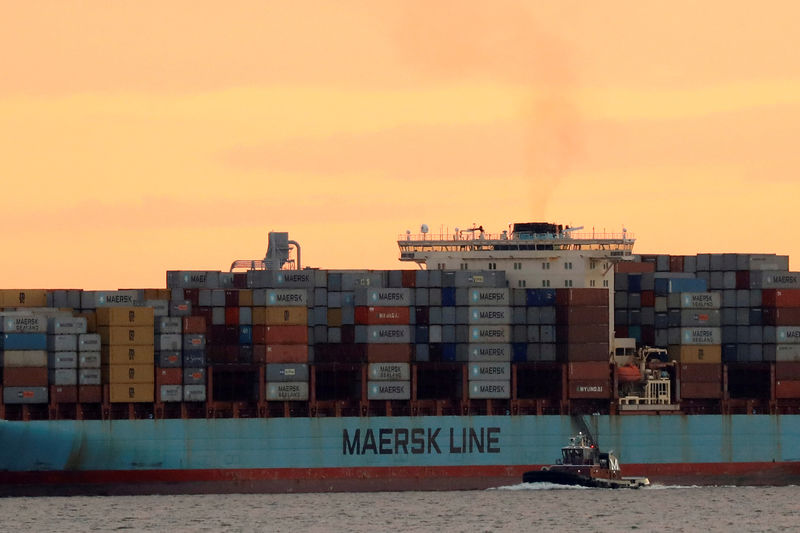 © Reuters. FILE PHOTO:The Maersk ship Adrian Maersk is seen as it departs from New York Harbor in New York
© Reuters. FILE PHOTO:The Maersk ship Adrian Maersk is seen as it departs from New York Harbor in New YorkBy Stine Jacobsen
COPENHAGEN (Reuters) – Denmark’s A.P. Moller-Maersk (CO:) plans to compete directly with package delivery companies UPS (N:) and Fedex (N:) as it expands its transport and logistics business, its chief executive said on Tuesday.
Maersk, the world’s largest container shipping company, sold its North Sea-focused oil and gas business in August to France’s Total (PA:) in a $7.5 billion deal in August as it focuses on transport and logistics.
As part of its restructuring, Maersk aims to expand its services to all parts of the supply chain, giving customers the chance to deal with one firm when shipping goods from one side of the world to another.
“We’re building this company that is a global integrated container business, a company very similar to UPS and Fedex,” CEO Soren Skou told investors at a capital markets day in Copenhagen on Tuesday.
“I hope they will be considered peers of ours, when we are done with this journey in 3-5 years,” he added.
The capital markets day was being held less than two weeks after the world’s largest container shipping firm missed profit forecasts and gave what analysts saw as a conservative outlook.
Maersk has acknowledged that despite handling one in seven containers globally, being the biggest is no longer enough, as the growth of e-commerce is driving demand for quicker, easier and more flexible shipping.
“Our customers businesses are to a large extent changing, they are being disrupted by new technologies, by e-commerce and new ways of doing things,” said Maersk’s chief commercial officer Vincent Clerc.
Maersk is betting that a digital drive, in which it for example has teamed up with IBM (N:) to create an industry-wide blockchain-based trading platform, will allow it to offer more value-added services in areas such as freight forwarding and trade finance.
However, on Tuesday investors were left with little detail on Maersk plans to monetize the blockchain project or how it will use the proceeds from breaking up the conglomerate.
Shares in Maersk were trading 4.6 percent lower at 10,400 Danish crowns at 1420 GMT, below the August level when the Total sale was announced and around same level as when it announced its new strategy in September 2016.
“Many had hoped for something more specific for example with regards to how the proceeds from the sale of Maersk Oil will be distributed,” said Sydbank analyst Morten Imsgard of the fall in share price.
The firm still aims to find solutions this year for its offshore drilling and supply service unit, which is being valued at $4.7 billion and $0.6 billion respectively according to analysts’ consensus.
Fusion Media or anyone involved with Fusion Media will not accept any liability for loss or damage as a result of reliance on the information including data, quotes, charts and buy/sell signals contained within this website. Please be fully informed regarding the risks and costs associated with trading the financial markets, it is one of the riskiest investment forms possible.
Source: Investing.com




























